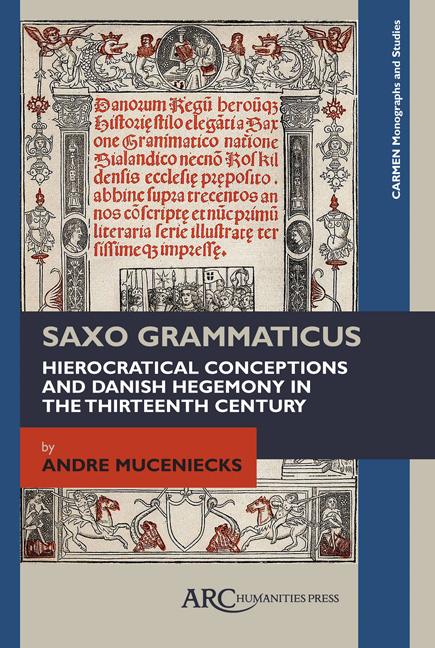Book contents
- Frontmatter
- Contents
- List of Illustrations
- Acknowledgements
- Foreword
- Preface
- Chapter 1 Denmark and the Baltic in the Thirteenth Century
- Chapter 2 The Work
- Chapter 3 Political Conceptions
- Chapter 4 Euhemerism and the East in Saxo Grammaticus
- Chapter 5 Virtues and Values in Saxo Grammaticus: The Four Cardinal Virtues
- Chapter 6 The Thematic of the Counsellor
- Conclusion
- Appendix 1 List of the Kings in Books I–VIII of the Gesta Danorum
- Appendix 2 Rulers and Archbishops of Denmark in Relation to Events in the Baltic, the Empire, and the Papacy
- Appendix 3 Genealogy of the Valdemarian Kings
- Bibliography
- Index of Persons
- Index of Places and Peoples
- Index of Authors and Primary Sources
- Index of Subjects
Chapter 5 - Virtues and Values in Saxo Grammaticus: The Four Cardinal Virtues
Published online by Cambridge University Press: 15 January 2021
- Frontmatter
- Contents
- List of Illustrations
- Acknowledgements
- Foreword
- Preface
- Chapter 1 Denmark and the Baltic in the Thirteenth Century
- Chapter 2 The Work
- Chapter 3 Political Conceptions
- Chapter 4 Euhemerism and the East in Saxo Grammaticus
- Chapter 5 Virtues and Values in Saxo Grammaticus: The Four Cardinal Virtues
- Chapter 6 The Thematic of the Counsellor
- Conclusion
- Appendix 1 List of the Kings in Books I–VIII of the Gesta Danorum
- Appendix 2 Rulers and Archbishops of Denmark in Relation to Events in the Baltic, the Empire, and the Papacy
- Appendix 3 Genealogy of the Valdemarian Kings
- Bibliography
- Index of Persons
- Index of Places and Peoples
- Index of Authors and Primary Sources
- Index of Subjects
Summary
KURT JOHANNESSON's STUDIES introduced novel interpretations and approaches to the workmanship of Saxo Grammaticus. The common approach from social sciences when dealing with thematics related to Germanic mythology was reviewed and partially expanded, concomitantly with the proposition of new questions and issues concerning Saxo's composition methods.
Certainly, the concerns about Germanic and Scandinavian mythology in the Gesta Danorum did not vanish at all, nor did the interest regarding the theme. Indeed, the addition of broader areas of knowledge attuned to medievalist and even classical studies enabled the development of wider understanding of Saxo's motivations, adaptations, and uses of ancient Scandinavian lore and tradition, in some way “rehabilitating” him as a primary source and making it possible to study Saxo and write about him in a way that was not simply derogatory.
There is a clear emphasis in the Gesta Danorum on moral values and virtues; beyond the simple concern to narrate bare facts there is an objective to draw value statements about these same facts. As discussed before, a simplistic view about the Gesta would rashly attribute to it a predominance of aristocratic and warrior values as well as the interest in military and oratorical deeds, a common topos also in other Scandinavian and even Icelandic sources; a detailed study of the values defended in the Gesta Danorum changes that vision considerably.
There is no possibility of analysing such values without considering stylistic questions such as the elaboration of schemes—often hermetic—and the ordering of the books. Into the plain narrative of deeds of kings and heroes Saxo inserted many patterns and elaborate schemes clearly intentionally. His narrative differs from his Icelandic contemporaries’ not only by the language, although his commission and education inclined him strongly to use methods derived from his study of Latinity.
When composing his poems, Saxo does not simply translate or “distort” skaldic or other kind of ancient Scandinavian lore; he creates something new in classic metre, trying to emulate authors from Classical and Late Antiquity. His interest in the aesthetics of composition is consistent with the poetics of the twelfth century; quoting Johannesson and his own citation of Faral, Saxo “might start with a proverb, a sententia or an example to indicate a general theme of the text but also to prepare the audience for the central, decisive part of the story.”
- Type
- Chapter
- Information
- Saxo GrammaticusHierocratical Conceptions and Danish Hegemony in the Thirteenth Century, pp. 67 - 104Publisher: Amsterdam University PressPrint publication year: 2017



